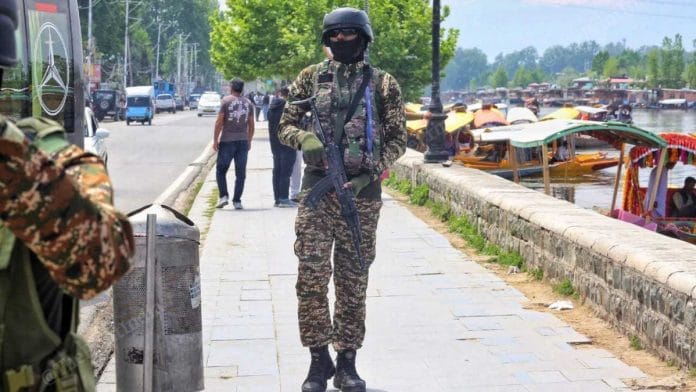Srinagar: Government of India believes the Pahalgam terror attack was sanctioned by the General Headquarters (GHQ) in Rawalpindi in line with Pakistan Army Chief Gen Asim Munir’s Islamist leanings, attempts to bring back global attention to Kashmir and reassert Pakistan’s stake in the issue, ThePrint has learnt.
Sources in the Indian defence and security establishment say the attack, in which tourists were singled out and shot, was greenlit on account of two key factors: evolving internal dynamics within Pakistan and the rapidly transforming situation in Jammu and Kashmir, particularly the sharp decline in recruitment of locals by terror outfits.
The attack, which claimed the lives of 24 Hindus, one Christian and one Muslim, violated an unwritten rule long observed by terrorists—that tourists, crucial to J&K’s economy, should not be targeted to avoid alienating the Kashmiri population.
This time, in a rare public response, Kashmir witnessed a complete voluntary shutdown, accompanied by widespread protests to denounce the attack at Pahalgam’s Baisaran valley. Former Jammu and Kashmir chief minister Mehbooba Mufti, in an interview to ThePrint, condemned the attackers as “terrorists” and called for strict action.
In the aftermath of the attack, ThePrint spoke with several defence and security sources to understand the broader strategic motivations behind this drastic shift in Pakistan’s posture.
Also Read: 2021 ceasefire goes up in flames as Pakistan lights up LoC along Kashmir days after Pahalgam attack
GHQ’s shift under Gen Munir
One of the most significant changes in Pakistan’s Kashmir policy stems from the rise of Gen Asim Munir as Chief of the Army Staff.
Munir, who was at the helm of the Inter-Services Intelligence (ISI) at the time of the Pulwama attack, is regarded as a staunch Islamist—unlike his predecessor, Gen Qamar Javed Bajwa, whose eponymous doctrine advocated a working relationship with India.
“Munir sees Bajwa’s softer approach as a failure. There were no talks, no cricket, no cultural exchanges and terrorists seen as ‘mujahideen’ were being systematically eliminated by so-called ‘unknown gunmen’. Meanwhile, the insurgency in Balochistan worsened,” said one source. Adding to Pakistan Army’s discontent was the embarrassment caused by the deadly Jaffar Express attack carried out by Baloch militants last month.
With rising domestic anger over Pakistan Army’s role in the jailing of former prime minister Imran Khan, sources say Munir was under pressure to assert the army’s strength and relevance. “Munir believes India is orchestrating unrest in Balochistan and elsewhere. Pahalgam attack is, in part, retaliation—calculated, meant to provoke,” said another source.
Further signs of a more aggressive stance were evident during Pakistan’s observance of Kashmir Solidarity Day (5 February), to which Hamas and Hezbollah representatives were invited. “This marks a pivot—from a narrative of Kashmiri ‘freedom struggle’ to a broader pan-Islamist campaign,” a third source pointed out.
According to multiple sources, Gen Munir sees reigniting conflict in Kashmir as a way to unify a fractured Pakistani state and reinsert the Kashmir issue into international fora, where traction for it has diminished. “Munir is gambling on this. He, in his mind, has calculated India’s response and believes Pakistan can manage it,” said the third source.
A peace too uncomfortable for GHQ
On the ground in Kashmir, Pakistan has been losing influence. Rapid development, infrastructure growth, and increased access to education and economic opportunities have begun reshaping the valley. “Kashmiris are now reaping the peace dividend. Many are studying and doing business across India. Even Jamaat leaders are contesting elections, and the Hurriyat is effectively defunct,” said the third source.
But the biggest blow for Pakistan has been a dramatic fall in recruitment of local Kashmiris as terror operatives. For instance, Pulwama—a former hotbed of militancy—saw zero recruitment of local residents by terror outfits over the past two years.
According to security agencies, of the roughly 80 terrorists active in Kashmir, only 18–20 are local, and the rest Pakistani nationals, who infiltrated into India sometime after 2020.
“In such a scenario, what kind of freedom struggle is this, when locals aren’t even joining in?” an official asked.
The Pahalgam attack, sources believe, was meant to instil fear, disrupt tourism, and provoke a backlash that could reverse these gains. Early signs are already visible—tourists are leaving Kashmir in large numbers, and many have cancelled travel plans to the UT.
At the same time, sources said targeting Hindu tourists was a deliberate move to deepen the communal divide and provoke a heavy-handed response from Indian security forces.
“Post-attack crackdowns will inevitably lead to mass detentions. Even if only two among ten friends are suspects, all ten may be picked up. This creates a sense of collective victimhood among the other eight,” said a fourth source. Security forces have been instructed to avoid hard tactics during searches to prevent alienating the local population, it is learnt.
Bigger picture: Terror for strategic gains
Pakistan’s goal, sources claim, is clear: revive terror recruitment, particularly local, and project the conflict as an uprising led by Kashmiris to gain international sympathy.
“The economy is growing, education is spreading, and no one wants to pick up the gun anymore. But if that economy slows, if Kashmiris feel targeted again, then that victimhood narrative returns. That’s what Pakistan wants and they will fish in these troubled waters to increase terror recruitment,” said one of the sources cited earlier.
The Pahalgam attack, then, is not just an isolated act of terror. It is a manifestation of the “Munir Doctrine,” a hardened military strategy aimed at sabotaging Kashmir’s economic progress, reviving militancy, and dragging the valley and the world back into a decades-old conflict, said sources in the Indian defence and security establishment.
(Edited by Amrtansh Arora)
Also Read: Pahalgam attack: Pakistan wants a never-ending war, let’s give it one







Bajwa was an urban Pakistani. Munir is a “dehaati” Pakistani. Cannot even speak English properly. One wonders how he managed to rise up the Pakistani military hierarchy and become the chief.
It has to be the handiwork of his Islamist benefactors. A reward for his services to the “cause of Islam”.